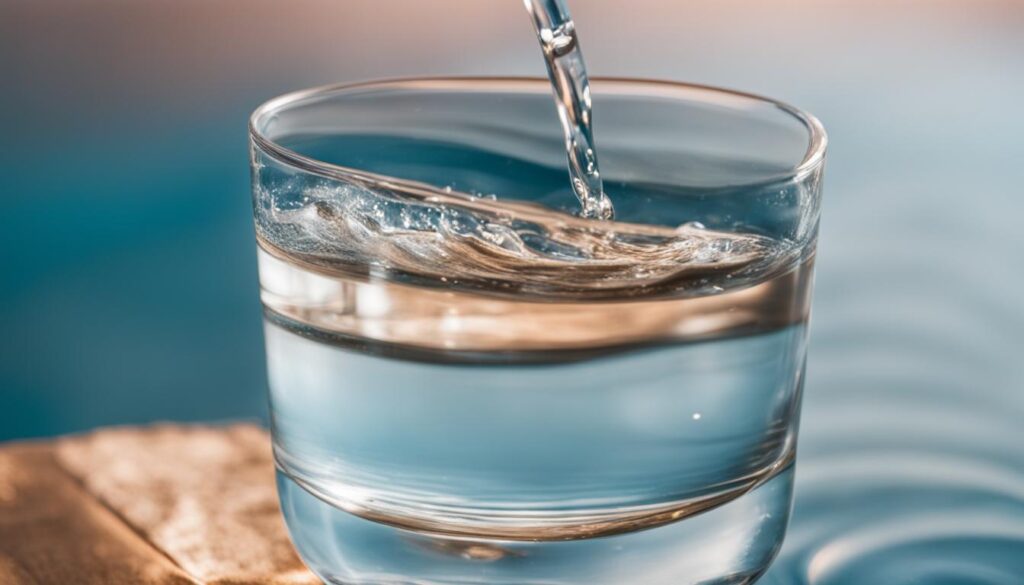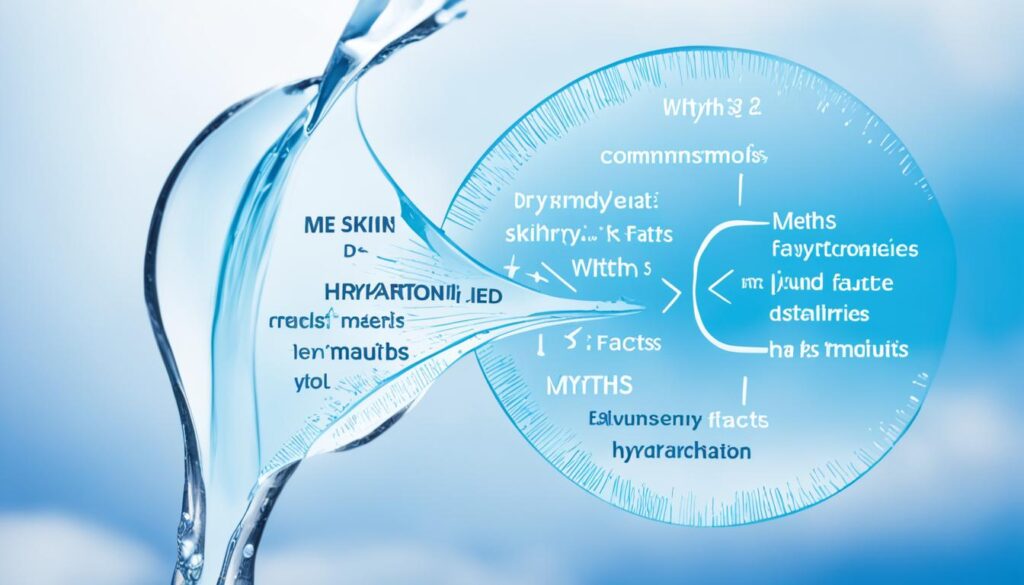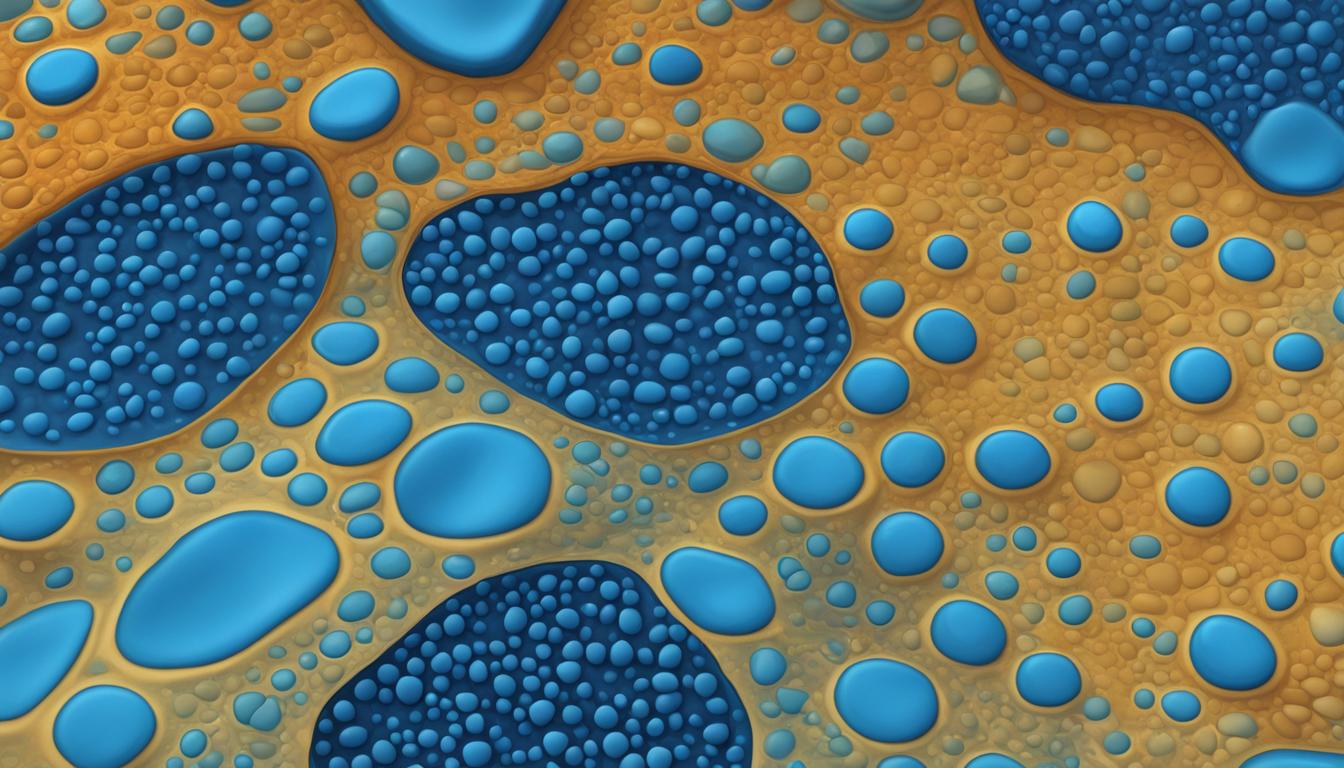The quest for radiant skin has long been a prevailing goal in the realm of beauty and wellness, and the link between water and skin health has garnered ample attention. Reverberating through the aisles of skincare aisles and the annals of dermatology research, the importance of water for skin is incontrovertible. Comprising approximately 64 percent of its composition, water is the foundation upon which the fortress of skin hydration stands.
Encompassing more than mere aesthetical allure, the hydration benefits for the skin signify a beacon of health. Those embracing increased water consumption for skin health observe their mirror reflections transform, as water bestows upon their complexions a radiant skin glow. Skincare and hydration merge in a symphony of rejuvenation, extolling the virtues of quenching one’s thirst as an essential harmony to daily skincare routines.
Key Takeaways
- The skin contains 64 percent water, underscoring its fundamental need for hydration.
- Adequate water intake is essential for not just skin, but overall bodily health, including digestion, circulation, detoxification, and absorption.
- Increase in hydration often leads to the skin’s enhanced radiance and may improve certain skin conditions.
- A balanced approach, including water intake and the use of hydrating skincare products, is advocated by dermatologists for optimal skin health.
- Applying products post-shower can maximize skincare benefits due to the skin’s increased absorbency in this state.
- Hydration can affect skin elasticity, reduce dullness, and make wrinkles and pores less prominent.
The Science Behind Hydration and Skin Health
Delving into the science of hydration reveals its critical role in maintaining not just life, but also the health and vitality of our skin. Understanding how water intake and skin wellness are interconnected is pivotal in the quest for a glowing complexion. While it may appear to be a simple act, drinking water engages a complex interplay of biological processes that enhance skin moisture levels and fortify cellular hydration.
Understanding Skin’s Water Content and Function
Our skin is the body’s largest organ, and its water content is crucial for its proper function. The skin’s structure is akin to a carefully woven tapestry, where water serves as both the thread and the cushioning. This aqueous matrix is responsible for giving skin its suppleness, resilience, and the ability to repair itself. As a protective barrier, it also relies on adequate hydration to defend against environmental factors that could compromise its integrity.
Research Insights: The Impact of Water Intake on Skin Properties
Evidence-based studies have shed light on how water consumption influences skin attributes. It’s been documented that an intake of 2.25 liters of water daily can modify the skin’s density and thickness, with benefits that may include a more robust and youthful appearance. Concurrently, a separate investigation demonstrated that the consumption of just two cups of water can proliferate blood flow to the skin, which is synonymous with nourishment and rejuvenation.
Cellular Hydration and Its Role in Skin Appearance
When it comes to the look and feel of our skin, the smallest units—our cells—hold tremendous sway. It’s within these microscopic building blocks that the magic of cellular hydration occurs. Hydrated cells appear plump and lustrous, reducing the visibility of wrinkles and blemishes, and promoting overall skin health. Moreover, a well-hydrated cell can better withstand external stress, thereby enhancing the skin’s elasticity and preventing damage.
Fascinatingly, various types of water, from the tap to the pristine springs, have been analyzed for their impact on skin. It’s suggested that not just the amount, but also the quality of water ingested, can influence our skin’s biomechanical qualities and its ability to maintain moisture levels efficiently.
How Hydration Affects Skin Conditions and Aging
The link between hydration and skin health is a topic often shrouded in mystery and misinformation. Yet, the infusion of hydration benefits to combat various skin conditions and mitigate aging skin is supported by scientific scrutiny. Beyond merely quenching thirst, regular water consumption can significantly improve skin elasticity, one of the hallmarks of youthful and durable skin.
Impact on Aging Skin: Aging is an inextricable part of life, and yet, how we age, particularly regarding our skin’s health and appearance, can be influenced by our hydration habits. The dermal layer undergoes gradual structural changes as we age, often reflected in decreased elasticity and increased wrinkling. By maintaining optimal hydration, these symptoms of aging can be visibly reduced, resulting in firmer, more resilient skin.
Hydration and Skin Conditions: For individuals grappling with persistent skin ailments—whether it’s the chronic dryness associated with eczema or the inflammatory onslaught of psoriasis—hydration can be a potent ally. Adequate water intake supports the skin’s capacity to heal and maintain barrier integrity, which is critical in the management and alleviation of discomforting skin conditions.
In the tableau of skin health, hydration plays a starring role:
| Benefit | Short-Term Hydration Impact | Long-Term Hydration Impact |
|---|---|---|
| Skin Texture and Glow | Enhanced suppleness and natural radiance | Sustained improvement in overall skin quality |
| Dermatological Health | Reduced severity of flare-ups in conditions like acne | Improved management of chronic skin conditions |
| Skin Elasticity | Immediate plumping effect reducing fine lines | Long-term enhancement of skin firmness and bounce |
| Wrinkle Appearance | Less prominent fine lines and wrinkles | Slower development of new wrinkles and fine lines |
Hydration serves as a fundamental, accessible way to enhance skin elasticity and combat the visible signs of aging. Though the amounts may vary among individuals, considering the influence of factors like climate and activity level, the consistent intake of water stands as an easy, essential ritual in skin care.
“Without adequate water intake, skin appears duller, and wrinkles and pores more prominent,” – Dr. Steven Deliduka, board-certified dermatologist at Forefront Dermatology.
Ultimately, nurturing skin health with persistent hydration can not only forestall the outward appearance of aging but also provide a therapeutic lifeline for those dealing with disruptive skin conditions. It illustrates the profound interconnectedness of our bodily systems and the simple, life-sustaining act of drinking water.
Practical Tips for Enhancing Skin Hydration Levels
The importance of water for skin is a well-established factor in maintaining a youthful and radiant appearance. Yet achieving optimal hydration extends beyond mere water intake. A comprehensive hydration strategy includes nutrition, skincare practices, and product selection to ensure maximal skin moisture and overall healthy skin.
Optimizing Your Water Intake for Healthier Skin
To ensure adequate hydration, the National Academies of Sciences, Engineering, and Medicine recommend roughly 13 cups of fluids per day for men and 9 cups for women. However, the actual need varies based on physical activity, climate, and individual physiology. Aiming to meet or slightly exceed these recommendations can play a pivotal role in achieving the hydration and healthy skin correlation; a principle reiterated by experts in dermatology. Remember, a persistently hydrated body will typically reveal its benefits through a softer, more vibrant complexion.
Beyond Drinking Water: Foods and Practices for Skin Moisture
One of the pivotal hydration strategies for skin moisture involves integrating water-rich foods into your diet. Vegetables like cucumbers and zucchini, along with fruits such as strawberries and watermelon, naturally boost hydration levels. In addition to consumption, certain lifestyle practices can aid in the retention of skin moisture. Foremost among these is avoiding exposure to excessively hot water, which can strip the skin of its natural oils, hence lukewarm water is more advisable for bathing and washing.

Another essential measure to preserve skin moisture is the use of a humidifier, particularly during dry seasons or in arid environments. Humidifiers help to maintain a hydrated atmosphere, thereby reducing the skin’s moisture loss to the environment.
The Role of Humectants and Emollients in Skin Hydration
Understanding the function of humectants and emollients reveals another dimension of skincare efficiency. Humectants including hyaluronic acid, act by attracting water molecules to the skin, thus offering a significant boost in hydration. On the other hand, emollients like ceramides work by forming a protective layer on the skin, preventing water loss.
An effective skincare routine takes advantage of both types of ingredients. Applying a humectant shortly after cleansing allows for an increased absorption of water, while an emollient layer can lock in this moisture. Here is a summary of recommended skincare ingredients that aid in hydration:
| Ingredient Type | Examples | Benefits |
|---|---|---|
| Humectants | Glycerin, Hyaluronic Acid | Attracts water to the skin |
| Emollients | Ceramides, Squalane | Softens skin and prevents water loss |
| Occlusives | Petrolatum, Beeswax | Forms a physical barrier to lock in moisture |
Finally, consistent application of these principles, along with regular monitoring of your skin’s response to hydration levels, will lead to optimal results. By cultivating these hydration habits, you can expect not only to enhance skin moisture but also to support the overall health and vitality of your skin.
Navigating Hydration Myths and Facts in Skincare
In the pursuit of luminous skin, hydration has become a keyword, ricocheting across countless beauty blogs and skincare forums. The echo chamber of the internet often propagates hydration myths, leaving many consumers navigating a sea of misinformation. Separating these myths from the skin hydration facts is critical to understanding the real impact of hydration on one’s skin health.
One omnipresent myth is that drinking excessive amounts of water will perpetually improve skin’s appearance. However, studies and expert opinions converge on the consensus that once the body’s hydration needs are met, the perceived benefits to the skin level off. This means that after reaching an optimal point, further water intake does not translate to increased skin health and can, in fact, prompt adverse effects such as water intoxication or hyponatremia.
The crux of the matter lies in understanding that the skin needs a balanced approach to hydration; it’s neither solely about the volumes of water consumed nor about lavish skincare regimens. To illustrate this, let’s consider topical hydration versus systemic hydration. While both are instrumental, their roles are distinct and complementary.
Proper hydration levels help the skin to become plump and improves its elasticity meaning it’s less likely to crack and have irritations and blemishes. – Dr. Steven Deliduka, board-certified dermatologist
| Hydration Source | Role in Skin Health | Myth vs. Fact |
|---|---|---|
| Systemic (Water Intake) | Supports overall hydration balance and aids in skin detoxification. | Myth: Unlimited benefits from increased consumption. Fact: Benefits plateau after meeting the daily recommended intake. |
| Topical (Skincare Products) | Directly provides moisture and protects the skin barrier. | Myth: All products work universally for every skin type. Fact: Effectiveness is subject to skin type and product ingredients. |
Furthermore, beyond quantifying hydration, the quality of the water plays a pivotal role. Tap water may differ from natural mineral water, which could bolster the biomechanical properties of the skin — another aspect not commonly addressed in conversations around hydration. An assortment of skincare products claim to hydrate but serve as no more than a placebo if not chosen wisely or used correctly.
Therefore, it’s essential for individuals to critically assess hydration claims and products, seeking authenticity and effectiveness rather than following generic advice. Optimal hydration—achieved through a balanced diet, adequate water intake, and a tailored skincare routine—still stands as a fail-safe approach to maintaining glowing, hydrated skin.

Water and Skin Health: The Connection Explained
The vitality of our skin, often perceived as a reflection of overall well-being, is deeply intertwined with our daily water consumption habits. Diving into the symbiotic relationship between hydration and skin health unveils layers of benefits, from quenching the body’s thirst to imparting a radiant skin glow. While the human body’s inherent complexity means that hydration recommendations cannot be one-size-fits-all, exploring these guidelines uncovers the intrinsic value of water as a nourishing elixir for the skin.
Evaluating Daily Water Consumption Recommendations
Often touted as a panacea for health, the ubiquitous suggestion of consuming eight glasses of water daily is a starting point for many on their journey to improved well-being. However, the actual daily water consumption for skin health can hinge upon various factors such as bodily needs, environmental influences, and lifestyle choices. Precision in personal hydration routines can lead to tangible skin health benefits, including enhanced natural moisture and skin resilience against environmental aggressors.
Signs of Proper Hydration and Its Visible Effects on Skin
Meeting and maintaining your body’s hydration demands manifests visibly through the condition of your skin. Among the tell-tale signs of skin hydration are a smoother texture, and yes, that sought-after radiant skin many dream of achieving. From clinical studies to anecdotal evidence, the spectrum of signs is a testament to water’s profound influence on the skin’s health and appearance.
Consideration of these signs not only helps gauge our internal hydration level but also serves as a compass for adjusting our water intake in the pursuit of optimal health. Subsequently, a glowing complexion becomes a beacon, showcasing the positive impact of conscientious water consumption on our largest organ—the skin.
| Hydration Indicator | Description | Impact on Skin Health |
|---|---|---|
| Complexion | Clear, bright appearance | Reflects adequate water intake and toxin removal |
| Elasticity | Skin’s ability to revert after being stretched | Indicative of well-moisturized, supple skin |
| Smoothness | Fewer dry patches and rough areas | Shows effective hydration and nourishment of skin cells |
| Softness | Gentle to the touch, with a silky feel | Signifies balanced water levels within the dermal layers |
In essence, the alchemy of daily water consumption for skin health transcends mere quenching of thirst. It’s a conscious communion with our body, observing and responding to its signals, sculpting our self-care rituals into a mosaic where every glass of water contributes to the fresco of our skin’s story.
Conclusion
The exploration of the intricate relationship between water and skin health has unveiled a clear message: hydration benefits are a cornerstone of a vibrant and resilient complexion. To yield the full spectrum of hydration benefits, it is crucial to understand that water consumption for skin health is not just about drinking the necessary amount of H2O, but also about synergizing dietary choices, lifestyle practices, and skincare routines.
Armed with scientific evidence and expert advice, incorporating the importance of water for skin into a comprehensive skincare strategy is not only wise but necessary. True skincare and hydration span beyond simple water intake; it embraces the application of moisturizers, the integration of humectants and emollients, and the conscious selection of foods that enrich the body with their inherent water content.
For those seeking to revitalize their skin or to address particular dermatological concerns, a personalized approach with advice from a dermatologist can be invaluable. As we strive for healthy skin, let us remember that the wellspring of hydration provides a foundation upon which to build our skincare aspirations. Whether we are sipping on a glass of water or meticulously applying our favored serum, each act is a step towards a more radiant and nourished visage.




